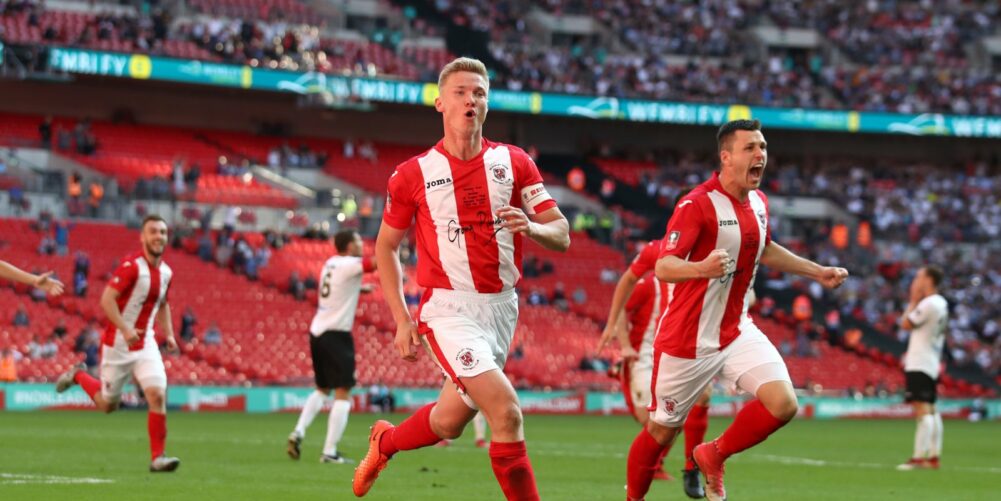With the 2018-19 season fast approaching crunch point, we caught up with Laurence Jones, Head of The National League System to discuss a number of talking points in the Non-League game.
RESTRUCTURING
The new divisions at Step 3 and 4 continue to bed in, which is positive news. Some of the clubs were moved across into new environments and they seem to be enjoying it.
It's incumbent on us to work closely with the leagues so we get a real insight into what's working and what needs improvement. There will always be occasions where some clubs have been moved and it's caused operational difficulties; we're respectful of that and thank those clubs because they, and the leagues, have made this work.
To put it simply, it's a huge thank you from everyone at The FA.
We've been transparent as to where we want the National League System to get to. The eighth division at Step 4 is a crucial development. That will be in place for season 2020-21 and we're starting the planning work now. It's important teams kick off next understanding what they are playing for.
This season's Step 4 promotion scenario and the ‘Super Play-offs' at Step 3 will be interesting but we have to recognise the National League System is transitioning. The four Alliance leagues are working incredibly closely together and are building their own strategic plan, which is a positive development.
There are ongoing discussions taking place to ensure a super play-off structure for this season between Step 3 and Step 2 will be resolved and we'll get two automatic promotion spots from each division for 2019-20.
Work will soon begin on next season's club allocations. As best we can we've got to try and avoid a repeat of the Shaw Lane situation. The club withdrew very late and we'd had no early warning they were likely to.
The regulations at the time had to be applied. The learning from that – and we've reacted very quickly – is that we've now changed the regulations. Should it happen again – you hope it doesn't but you can't say it won't because that happens in football – any disruption will be kept to an absolute minimum and far more constrained than the repercussions of Shaw Lane. We think the amended regulations will ensure there won't be a ricochet effect across the country.
It's the principle that as soon as the club allocations have been released by The FA, between then and the AGMs, any changes are likely to be within that particular league. We aim to have as little movement as possible and mindful that by that stage of their pre-season, clubs will have appointed managers, who will have a recruitment plan of players. So any move could have unintended consequences. As best we can, we've got to keep disruption to a minimum if there is a late withdrawal.
The role of The FA is to support our leagues and clubs. There is a far greater level of customer focus than perhaps we've had previously and, by nature of the scale of the National League System there will always be some issues – that happens in any large structure. It's how we resolve those issues and work with our clubs. The FA is genuinely here to support and help. It's a big reason why we attended all the Step 3 and 4 League's club meetings at the end of last year.
The clubs asked some really reasonable and honest questions.
It's got to be for the betterment of the game that the relationship between The FA and the clubs is such that clubs feel at ease to have this dialogue. We recognise how tough it is running football at this level and the hours of dedication from volunteers, so it's important they feel they are able to get the service and support they need from us.
GROUND GRADING
Our vision is to modernise and raise standards. There is work being done to give it more teeth but we have got to give clubs greater support in ground grading. Clubs also have a responsibility at this level of the game to meet the criteria being set.
The hot topic at the moment is the size of dressing rooms at Steps 3 and 4. That change to the ground grading criteria took place back in 2014. We are working closely with the leagues and the vast majority at Step 3 and 4 meet the criteria.
A number of clubs are working with the leagues to ensure they comply by March 31 or we have extended the deadline to July 31 if those clubs can demonstrate that the right things such planning permission, grant applications are in place.
The reality is, however, that extensions expire, but we desperately don't want to see clubs relegated through ground grading issues.
Funding to is available to avoid this through the Football Stadia Improvement Fund, managed by the Football Foundation. Support from the leagues is on offer and ground grading officers are available to advise. Suffice to say we're here to support the clubs too.
We are awaiting the leagues' latest update, but the numbers being quoted and the number of clubs who actually have a serious challenge are not as high as have been suggested of late.
A variation of the same question often comes up – why does this even matter?
There's a wider context to ground grading across the National League System. It shouldn't just be about meeting the minimum criteria but done in such a way, with the grants that are available, to help clubs raise standards.
People who pay to watch football, want to watch football in good facilities. We've got to look at how we can help clubs achieve that. It's all about raising standards. If we can get the ground and stadium stock to a certain standard, that is going to make it more attractive to people to come and watch football at this level of the game.
When you talk about compliance and the old adage that's bandied around of, ‘Why have we got to have X amount of seats when we don't need them?', what people tend to forget is it's a progressive model where, when you're looking to move up the leagues or go into the English Football League and fortunate enough to be in that position at a later stage, you've not had to face a large financial investment in one go. It's been a progressive investment.
If a club is going from Step 5 to Step 4, for example, and that gap is too big, the demands in terms of grading are too big, then those clubs are really going to struggle to meet the criteria. We need to avoid putting the clubs in an unfair position.
Our aim is to get better at linking ground grading to funding. That's one of our big challenges strategically. We understand the challenges. Money is tight and it is hard sometimes to raise standards in grounds that are very historic. We do recognise that but you've got to have a minimum criterion at this level of the game.
PLAYER REGISTRATIONS AND ELIGIBILITY
We recognise that this has become a very complex area for clubs and and most club secretaries are volunteers. We work hard to communicate and provide education as to what people do and should be doing. If there's one message then it's: If in doubt, contact us.
The infrastructure around player registration is so crucial and highly regulated and we don't want to see clubs fall foul of any registration issues. It's about how we all work together. We want football to be decided on the pitch. So, if in doubt, please contact us.
ENGLAND C IS A VITAL COG
The England C team is a really important part of what this organisation does. It gives the players who play at the highest levels of the National League System, the opportunity to represent their country and, more importantly, the opportunity to move on to the higher levels of the game. Its part of the vision for the development of National League System football.
As far as the competition element goes, The International Challenge Trophy hasn't been around for a number of years although we would welcome the opportunity to re-establish the competition.
Historically there wasn't the number of UEFA competitions for development teams ranging from U16 to U23 that now exist. Historically the England C team would have played the U21 or U23s from the other country.
So that is a challenge because we have to actively source opponents. Interestingly, we have had more representative and England C games in the last 12 months than we've had historically and we are actively planning the fixture programme for next season.
I do see the importance and value of an England C team and The FA Representative teams to be used in an ambassadorial level. In my opinion, that does not devalue the England C team, provides international recognition to players who are awarded international caps whilst still giving an opportunity for players to progress to the higher levels of the game.
We are working on a fixture programme for next season which we'll release details of when they are confirmed.
ALL SET NOW FOR A FAB FINALS DAY
Planning for this year's Non-League Finals Day is well underway. Looking at the two competitions and the teams left in, it's set to be another really exciting occasion.
It is one of the best days in the football calendar, in my opinion. It's a celebration of everything that is positive and good about our level of the game. It's great to see the football family come together for what, over the last three years have been three brilliant days of football.
We'll promote it as widely as we have in previous years and want to make sure each of the finalists has a really memorable day out at Wembley. We're always looking to get more people in year on year. Of course that will come down to the clubs' base, but we have a larger neutral section to encourage people not connected with any of the clubs to come too.
As you'd expect the feedback to the doubling of the FA Cup prize money has been incredibly positive. That level of investment into the game is absolutely critical for clubs.
We are well advanced in discussions for what next season is going to look like and while it has yet to be confirmed, there is a good possibility that the 75-25 prize money split will be extended to the fourth round qualifying.
On a similar vein we are also well advanced with discussions of doing something similar in the FA Trophy.
LET'S MAKE IT FUN FOR THE FAMILY
This level of football is really unique and we want more people to watch the game at this level. We want it to be a family friendly environment where mums, dads, sons and daughters can watch a good level of football at a reasonable price, have a drink, something to eat and have an enjoyable afternoon.
This is what the National League System is about; clubs at the centre of their community reaching out providing a good value for money football experience, but also creating that sense of ownership and loyalty to their local club.
We all have a responsibility to make sure we create the right environment. Every club wants more people coming through the turnstiles, it is a unique brand and one we must value and cherish.
It's everyone's responsibility to create a positive environment that will reach out and attract more people to support our level of the game.




















